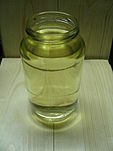
Gasoline __ /ˈɡæsəliːn/, or petrol __/ˈpɛtrəl/, is a transparent petroleum-derived liquid that is primarily used as a fuel in internal combustion engines.
It consists mostly of organic compounds obtained by the fractional distillation of petroleum, enhanced with a variety of additives. Some gasolines also contain ethanol as an alternative fuel. In North America the term "gasoline" is often shortened in colloquial usage to "gas" but some people use the term "petrol". Under normal ambient conditions its material state is liquid, unlike liquefied petroleum gas or "natural gas".
Gasoline is more volatile than diesel oil, Jet-A, or kerosene, not only because of the base constituents, but also because of additives. Volatility is often controlled by blending with butane, which boils at -0.5 °C. The volatility of petrol is determined by the Reid vapor pressure (RVP) test. The desired volatility depends on the ambient temperature. In hot weather, petrol components of higher molecular weight and thus lower volatility are used. In cold weather, too little volatility results in cars failing to start.
Gasoline is more volatile than diesel oil, Jet-A, or kerosene, not only because of the base constituents, but also because of additives. Volatility is often controlled by blending with butane, which boils at -0.5 °C. The volatility of petrol is determined by the Reid vapor pressure (RVP) test. The desired volatility depends on the ambient temperature. In hot weather, petrol components of higher molecular weight and thus lower volatility are used. In cold weather, too little volatility results in cars failing to start.
Is it called Petrol or Gas?
Why Do Americans Call it Gasoline? | #shorts
Petroleum refining processes explained simply
Stale Gasoline Petrol - What you need to know!


Mogas


